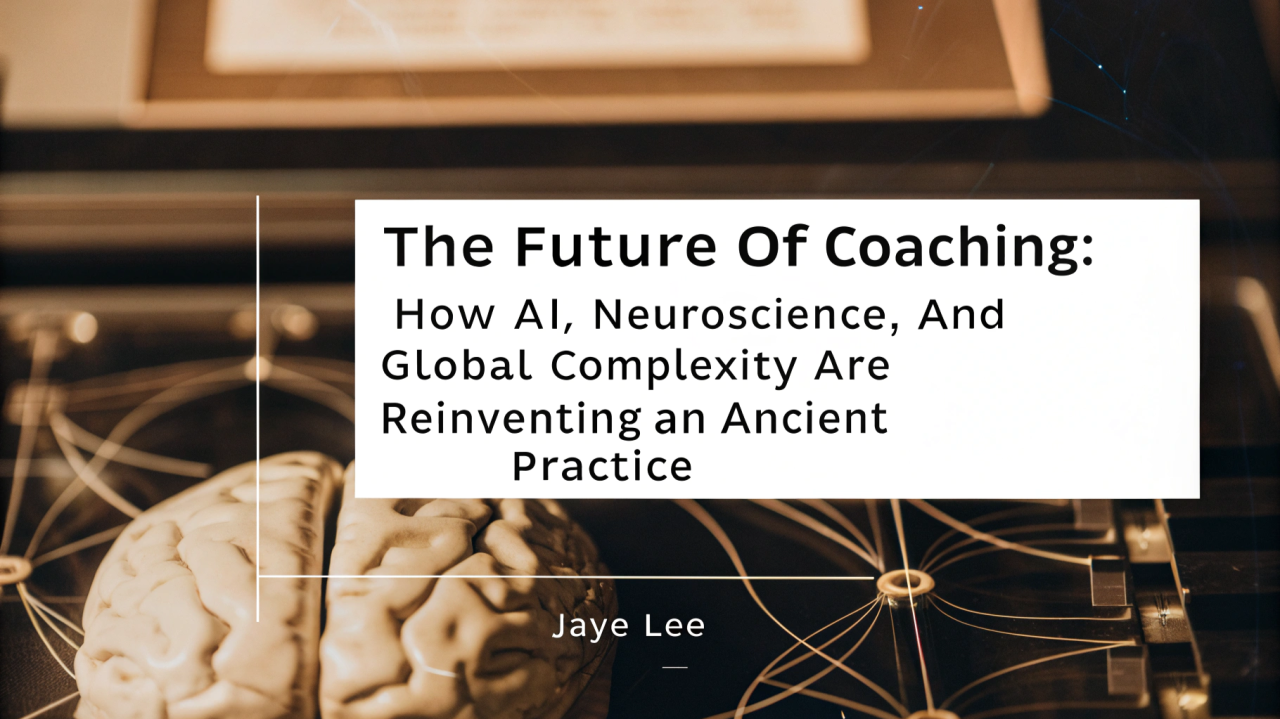
How AI, Neuroscience, and Global Complexity Are Reinventing an Ancient Practice

Jaye Lee
Business Strategist for Therapists & Coaches | ICF PCC | Scaled 3 Startups | Certified Mentor Coach & Supervisor | CEO Whisperer for the Helping Professions
The $45,000 Conversation That Changed Nothing
“I just spent $45,000 on executive coaching last year,” my friend confessed over coffee, lowering his voice despite the ambient chatter of the Singapore café drowning out our conversation. “And I’m not sure I got anything tangible from it.” As the CEO of a rapidly scaling fintech company, he’s exactly the type of leader who should benefit from coaching.
Smart, ambitious, open to growth. Yet there he sat, questioning whether the considerable investment of time and money had moved the needle in any meaningful way. His experience isn’t an anomaly. It’s a symptom.
The coaching industry projected to reach $20 billion globally by 2026 according to the International Coaching Federation (ICF) stands at a fascinating inflection point. While demand for coaching continues to surge, the traditional coaching paradigm itself is showing cracks that can no longer be ignored.
As someone who has observed the evolution of professional development for over two decades, I’m convinced we’re witnessing not just an iteration of coaching, but its complete reinvention. The forces reshaping this landscape are as diverse as they are powerful: technological upheaval, neuroscientific breakthroughs, geopolitical complexity, and fundamental shifts in how we understand human potential.
This transformation raises profound questions: What will coaching look like in five years? Who will deliver it? And perhaps most importantly, will it finally deliver on its promise to catalyze genuine transformation?
Let’s explore what’s really happening and why the future of coaching might look nothing like its past.
The Coaching Paradox: Growing Investment, Questionable Returns
Before we leap into the future, let’s assess our starting point.
The data tells a contradictory story. Organizations now spend billions annually on executive coaching. Simultaneously, industry analysts emphasize the lack of standardized outcome measurement in coaching engagements.
This creates what I call the “coaching paradox”: ballooning investment coupled with murky measurement. We’ve somehow normalized spending tens of thousands of dollars on interventions without clear ROI mechanisms.
“To be blunt: In what other business function would this approach survive? “
“The coaching industry has operated on faith for too long,” notes a dear ICF MCC Coach of mine who prefers not to be named. “We’re seeing organizations finally demanding the same rigor they apply to other development interventions.”
This tension between growing demand and accountability deficits creates the perfect conditions for disruption. And disruptive forces are already reshaping the landscape in five fundamental ways.
1. Neuroscience Is Rewriting the Coaching Playbook
Research from the NeuroLeadership Institute demonstrates that coaching approaches aligned with how the brain functions produce measurably superior outcomes. This isn’t about superficial “brain hacks”: it’s about understanding neuroplasticity, attentional control networks, and threat-versus-reward responses at a sophisticated level.
Consider how this translates into practice:
- Traditional approach: “What would success look like for you?”
- Neuroscience-informed approach: “Let’s activate your visual cortex by creating a detailed mental simulation of your successful future state, which research shows increases motivation and goal attainment.”
The difference is subtle but profound. By understanding which coaching interventions create actual neural changes, not just momentary insights and practitioners can design experiences that rewire clients’ brains for sustained performance.
The future isn’t AI replacing coaches. It’s coaches who leverage AI outperforming those who don’t by orders of magnitude.”
2. Technology: From AI Threat to Augmented Intelligence
Primitive coaching functions are already being successfully automated. Platforms like Coach.me, BetterUp, and CoachHub provide algorithmic accountability, diagnostics, and personalized content delivery.
The most sophisticated coaching organizations are pursuing “augmented coaching intelligence”, combining human emotional intelligence with AI’s pattern recognition abilities.
3. From Individual to Systems Coaching
“Traditional coaching assumes individual behavior change drives organizational outcomes,” explains Dr. Jennifer Garvey Berger, author of Changing on the Job . “But complex systems theory shows us this is often a flawed assumption.”
Forward-thinking organizations are implementing multi-level coaching ecosystems that include team, organizational, network, and cultural coaching.
4. Global Complexity Demands Contextual Intelligence
Universal coaching frameworks are a myth, and effective coaching must be culturally calibrated.
This calibration requires understanding how historical, economic, political, and cultural factors shape human development. For example:
- Feedback reception triggers different threat responses across cultures.
- Power dynamics influence coach-client interactions in high vs. low power-distance cultures.
5. The Measurement Revolution: From Satisfaction to Transformation
The industry’s historical metrics from client satisfaction, coach credentials, and subjective reports are being supplanted by behavioral analytics, network analysis, economic valuation, and longitudinal studies.
Research indicates that momentary insights rarely lead to lasting change, a point emphasized by coaching experts like Dr. Terry Jackson, who stress the need for data-driven approaches over intuition.
The New Coaching Paradigm: Integrated Intelligence
These five forces: neuroscience, technology, systems thinking, contextual intelligence, and measurement rigor are converging to create “Integrated Intelligence Coaching.”
The coach of the future needs to be equal parts scientist, systems thinker, technologist, and humanist.
Preparing for Coaching’s Future: Five Strategic Imperatives
- Develop Scientific Literacy: Dedicate 20% of professional development time to neuroscience, behavioral economics, and adult development theory.
- Embrace Technological Augmentation: Experiment with AI-augmented coaching tools while defining your human value proposition.
- Expand to Systems Perspective: For every individual coaching engagement, incorporate systemic factors into the approach.
- Build Contextual Intelligence: Develop cultural calibration protocols for global coaching.
- Implement Rigorous Measurement: Establish baseline measures and impact indicators across behavioral, organizational, and financial dimensions.
The Great Coaching Divergence
As we look toward the horizon, one thing is clear: we’re witnessing “The Great Coaching Divergence.”
On one path, coaching continues as a largely unregulated industry where effectiveness remains subjective. On the alternate path, coaching evolves into a sophisticated practice integrating multiple knowledge domains, leveraging technology, and demonstrating clear impact.
The choice between these paths belongs not just to coaches, but to organizations and individuals investing in coaching services.
About the Author: Jaye is a Business Strategist and Mentor to Entrepreneurs in the Helping Profession. Based in Singapore, she supports therapists, coaches, and wellness professionals in scaling their impact and building sustainable businesses. Her work focuses on translating clinical expertise into entrepreneurial success, leveraging over a decade of experience in coaching, training, startup development, and strategic growth
#FutureOfCoaching #NeuroLeadership #AICoaching #SystemsThinking

0 Comments